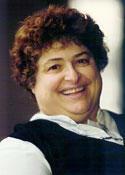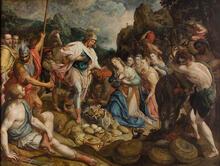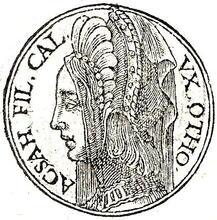Wife of Job: Apocrypha
"Job on the Ash Heap," by José de Ribera, c.1630. Via Wikimedia Commons.
While the Wife of Job has a limited role in the biblical narrative, the apocryphal Divrei Lyov transforms her into a central character of the plot. Unique to the apocryphal account, Job is cited as having two wives, Uzit and Dinah, whereas the midrashic account has Job marrying only one woman. Divrei Lyov relates that Satan maltreated Uzit, just as he persecuted Job himself, and Uzit’s continuing suffering made her the target of people’s contempt and pity. After the death of Uzit, Job marries Dinah, Jacob’s daughter. Dinah bore Job seven (or fourteen) sons and three daughters; Divrei Lyov imparts special standing to Job’s daughters.
Background
In the Biblical narrative, the role played by Job’s wife is limited to a short and penetrating conversation with her husband. The apocryphal Divrei Iyov, however, devotes a great deal of attention to this character. According to the latter work, Job had two wives, the first of whom was named Uzit (in Greek transliteration: Sitidos), after the land of Uz where Job and his wife lived, and who, according to the appendix to the Septuagint, was an Arab woman. Job’s second wife, Dinah daughter of Jacob, bore him his sons and daughters when the Lord blessed him, at the end of the book of Job.
Divrei Iyov transforms the wife into a central character of the entire plot. Several of the misfortunes that the Bible ascribes to Job are transferred to her, several of Job’s complaints are now voiced by her, and in several aspects she is portrayed as more unfortunate and afflicted than Job himself. During the forty-eight years that Job suffered and dwelled outside the city sitting in ashes, his wife bore the burden of the family’s livelihood. She would carry water to the house of a wealthy family, like a maidservant, to bring a little food for herself and her suffering husband. When she did not have enough food for both of them, she would share her bread with him; and when she could no longer provide for them, she went to the marketplace to beg for a piece of bread from the bread sellers.
Uzit
Divrei Iyov relates that Satan maltreated Uzit just as he persecuted Job himself. He knew that Uzit went to the marketplace, so he disguised himself as a bread seller. Satan convinced her that he would give her three loaves of bread (sufficient for three days) if she would give him the hair of her head. Uzit said to herself: “Of what use to me is my hair when my husband is starving?” (Divrei Iyov 23:9), and Satan cut off her hair in view of all (ibid., chaps. 22–25). This act led Job’s wife to the breaking point, and she bemoaned her bitter fate to her husband. In her distress, she called out to Job: “Say something against the Lord and die!” (25:9), thus hoping to escape her toil and labor on behalf of her helpless husband. In contrast with the short sentence uttered by Job’s wife in the Biblical narrative (2:9), in Divrei Iyov she delivers a quite lengthy speech. The appendix to the Septuagint contains an intermediate version, on which the expanded version of the apocryphal work was based.
Uzit’s continuing suffering made her the target of people’s contempt and pity and her bitter fate is the subject of a special lament (chap. 25) that describes her as a woman whose heart and bones have been broken by her troubles. This sorrowful hymn in Divrei Iyov places Uzit’s former high station and riches in stark contrast with her present deprivation:
Who shall not be astonished that this is Uzit, the wife of Job. Once she had a palanquin with fourteen curtains covering it […] and now she trades her hair for bread […] Behold, the one who was wrapped in fine linen with gold filigree now is garbed in rags and sells her hair for bread (25:1–6).
After this, Uzit engages in hard labor to sustain herself and her husband (chap. 39). She then leaves her employer, and when Job’s friends come to visit him, she asks them to order the excavation of the ruins of the house that had fallen on her children and killed them, and extricate the bodies. Job prevents them from doing as she wishes, saying that the dead have ascended to Heaven, but his friends see this as a sign of the madness that has possessed him (chap. 39). The unfortunate woman eventually returns to her place of employment to receive her wages and dies there in one of the animals’ stalls. Job’s wife receives the honor due her only after her death, when her many acts of kindness to all become known, and the poor of the city greatly mourn in her honor and chant a lament (chap. 40).
Dinah and Job’s Daughters
After Uzit’s death Job marries Dinah, a woman from a distinguished family, that of Jacob (Job presented himself as a descendant of Esau). Dinah bore Job seven (or fourteen) sons and three daughters. (For other traditions concerning Dinah, see the entry: Dinah.)
Divrei Iyov imparts special standing to Job’s daughters. The Bible asserts that “nowhere in the land were women as beautiful as Job’s daughters to be found” (Job 42:15), and that he gave them estates as he did to their brothers. In the midrashic account, Job divided his property only among his seven sons, which grieved the daughters, who demanded their portion. In response, their father states that they would receive a special inheritance which was hidden within three gold chests. Job opens the chests and takes out three embroidered girdles that give off sparks as fiery as the rays of the sun (chap. 45). Job promised the girls that this special garb would make their lives better, they would fear no man, and they would not have enemies. “This portion is better than the portion of the sons, because it is from Heaven.” The daughters accepted their gift and wore the girdles, which had an immediate effect upon them: Jemimah spoke in the language of the angels and sang as the angels sing; Keziah praised all the acts of Heaven; and Keren-happuch spoke in the language of the cherubim (chaps. 48–49).
At the end of his life Job relates all that befell him to his sons and daughters, and thus the readers, as well, become aware of his first wife and all that the couple experienced. Job asks Jemimah to play the lyre, Keziah to hold the incense pan, and Keren-happuch, to beat on the drum. Only the daughters are privileged to see the chariot of light that comes to take Job’s soul, and they accompany the chariot with song (chap. 52).
Adapted from Hananel Mack. Job and the Book of Job in Rabbinic Literature (Hebrew). Ramat Gan: 2004, 52–62.









